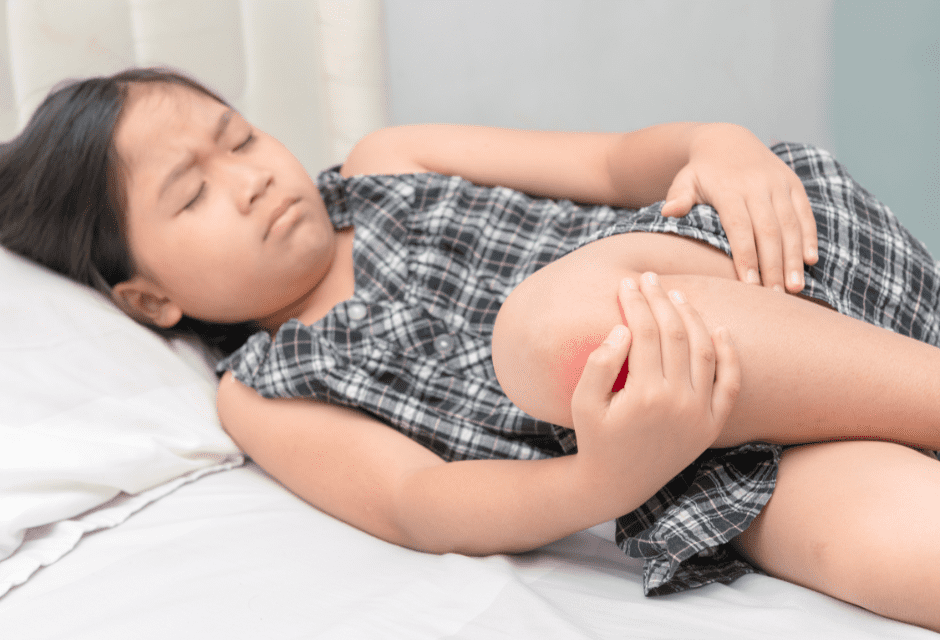
Jump to section
Juvenile idiopathic arthritis is an autoimmune condition in children below the age of sixteen years that causes swelling, stiffness and
tenderness in the joints.
Juvenile idiopathic arthritis is an umbrella term for multiple types of arthritis that occurs in kids. If your child has swelling, stiffness in one or more of their joints that lasts at least six weeks, and all other potential causes for these symptoms have been excluded, they may be diagnosed with JIA. There are many types of juvenile idiopathic arthritis that vary by their symptoms and the number of joints that are typically affected during a flare. These include:
The term ‘idiopathic’ means that it has an unknown cause or may arise spontaneously, so it is not currently known why juvenile idiopathic arthritis develops. There is evidence to suggest that your genetics and a presence of a gene called HLA antigen DR4 may increase your risk, although JIA is not considered to be a hereditary disease. Certain environmental factors (like viruses or bacteria) can also trigger the disease to activate.
While we’ve detailed specific symptoms depending on the type of juvenile idiopathic arthritis you have above, children with JIA may experience:
Unlike rheumatoid arthritis that is also a type of autoimmune arthritis and presents with recurrent flares throughout a lifetime, many children will outgrow their JIA. As childhood and adolescence is a crucial time for children’s growth and musculoskeletal development, JIA does have the potential to negatively (and permanently) interfere with the growth process - and where good management from a multidisciplinary care team can be of immense value.
A diagnosis for JIA is typically done with your doctor and/or rheumatologist. There is no single test to confirm JIA, and other causes of joint swelling and your symptoms should be ruled out. You’ll likely have multiple blood tests, and depending on how long the symptoms have been present, imaging scans may be requested to assess any existing damage.
As there is no cure for JIA, medical treatments focus on managing any symptoms during and between flares to help children live a normal life. This is best done with a multidisciplinary team management approach where podiatry is an important part, given the common effects of arthritis on the feet.
Our goal here at The Feet People is to help children stay mobile and active with as little disruption to their everyday lives. We work to help maintain or improve their comfort on their feet, while supporting healthy muscle and joint function. As kids love to run and play, it’s important to help them keep up with their peers and participate in social activities wherever possible. We also work to help limit any damage that may have future consequences for their mobility or quality of life.
Every child under the expert care of our podiatry team across our Brisbane CBD and Newmarket clinics has a tailored treatment plan that is specific to their symptoms and how their arthritis is affecting them during and in-between flares. By working with our podiatrists, your child will:
| Monday | 7:40am - 6:00pm |
| Tuesday | 7:40am - 6:00pm |
| Wednesday | 7:40am - 6:00pm |
| Thursday |
7:40am - 6:00pm |
| Friday | TEMP CLOSED |
| Saturday | CLOSED |
| Sunday | CLOSED |
Ground Floor, 344 Queen Street,
Brisbane City QLD 4000
| Monday | 7:40am - 6:00pm |
| Tuesday | 7:40am - 6:00pm |
| Wednesday | 7:40am - 6:00pm |
| Thursday |
7:40am - 6:30pm |
| Friday | 7:40am - 5:00pm |
| Saturday | 7:40am - 4:30pm |
| Sunday | CLOSED |
Newmarket Village, 114/400 Newmarket Rd, Newmarket QLD 4051